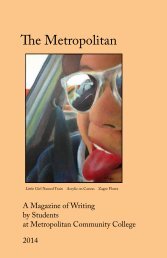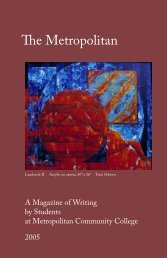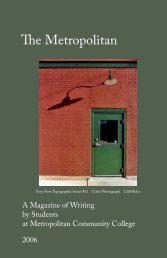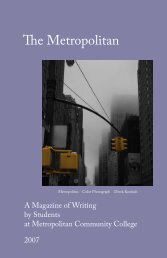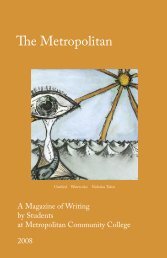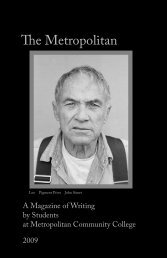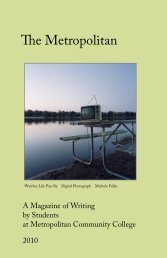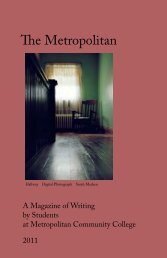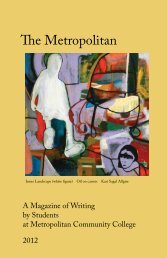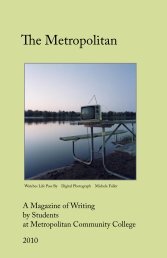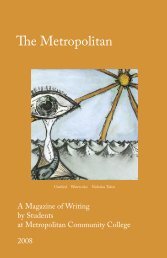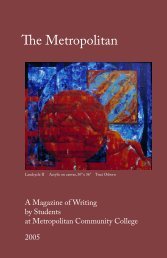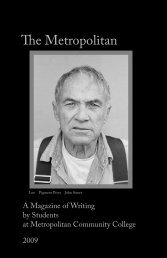The Metropolitan 2006 Issue
Create successful ePaper yourself
Turn your PDF publications into a flip-book with our unique Google optimized e-Paper software.
<strong>The</strong> <strong>Metropolitan</strong><br />
A Magazine of Writing<br />
by Students<br />
at <strong>Metropolitan</strong> Community College<br />
<strong>2006</strong><br />
Very New Topographic Series #11 Color Photograph Cliff Boler
<strong>The</strong> <strong>Metropolitan</strong><br />
A Magazine of Writing<br />
by Students<br />
at <strong>Metropolitan</strong> Community College<br />
<strong>2006</strong><br />
To our fellow student and editor, Mary Voight
<strong>The</strong> <strong>Metropolitan</strong> <strong>2006</strong><br />
Editors:<br />
Cindy Catherwood<br />
Lorraine Duggin<br />
Bob Ericson<br />
Gretchen Heal<br />
Leah Hoins<br />
Erin Joy<br />
Technical Advisors: Buffi Union, Jamie Bridgham, Katie Wudel<br />
Editorial Assistant: Jane Smith<br />
<strong>The</strong> <strong>Metropolitan</strong> publishes all types of academic and literary writing, including<br />
descriptive, narrative, expository, and persuasive works, as well as creative<br />
prose and poetry. We encourage writings from across the disciplines and also<br />
welcome visual art. Our goal is to showcase the best of the many voices, styles,<br />
and subjects Metro writers and readers find meaningful and to support critical<br />
thinking, creativity, and expression at <strong>Metropolitan</strong> Community College.<br />
<strong>The</strong> <strong>Metropolitan</strong> is published once a year. <strong>The</strong> print edition includes<br />
the best selections from the full web edition which can be read at<br />
http://commhum.mccneb.edu/metropolitan<br />
Inquiries to metropolitan@mccneb.edu or to<br />
<strong>The</strong> <strong>Metropolitan</strong><br />
c/o Cindy Catherwood<br />
South Omaha Campus<br />
<strong>Metropolitan</strong> Community College<br />
P.O. Box 3777<br />
Omaha, Nebraska 68103-0777<br />
Sheila Magnuson<br />
Courtney Mertes<br />
Brett Mertins<br />
Todd Richardson<br />
Katie Stahlnecker<br />
Mary Voight<br />
Contents<br />
<strong>2006</strong> Writing Awards<br />
Tom Jackson<br />
<strong>The</strong> Dream 5<br />
Karen Kozak<br />
Two Motorcycles 11<br />
Stinging March Snow 11<br />
Christina Garrison<br />
Potter’s Field 12<br />
Jessica Shimerdla<br />
for L. #3 (he melts my pride with his<br />
apathy) 18<br />
corpse pose. 19<br />
Carol McCabe<br />
<strong>The</strong> Ethics of Using Digitally Altered<br />
Photographs in Photojournalism 20<br />
A.J. Bernhagen<br />
Magnifico’s Secret Name 25<br />
Printed in Omaha, Nebraska by Barnhart Press<br />
©<strong>2006</strong>
<strong>The</strong> Dream<br />
Tom Jackson<br />
<strong>2006</strong> Writing Awards<br />
For his essay “<strong>The</strong> Dream,” Tom Jackson is the winner<br />
of <strong>The</strong> <strong>Metropolitan</strong> <strong>2006</strong> Prize for Student Writing, a 4.5<br />
credit hour tuition remission, sponsored by the <strong>Metropolitan</strong><br />
Community College Foundation. <strong>The</strong> first runner-up is Jessica<br />
Shimerdla for her poem “corpse pose.” <strong>The</strong> second runner-up is<br />
Christina Garrison for her essay “Potter’s Field.”<br />
From “Dump Day”<br />
Mary Voight<br />
Dad and I are in the cab of the truck, talking about the<br />
items we need to look for, and he turns to me and says, “Mary,<br />
don’t pick up any more old books. You have so many, there’s no<br />
more room left on your bookcase to put them.” My eyes start to<br />
tear and he tells me I can get some, but I will have to keep them<br />
in a box under the bed until he can make another bookcase.<br />
I am so high in the sky, soaring like an eagle, yet<br />
motionless. Trees and buildings dot the landscape far below me<br />
as I gaze about the cinematic view… so high that I can see for<br />
miles in every direction, yet so near to the ground that I can see<br />
the faded, red chips of paint peeling back from the weathered<br />
barn door off to my right and the brilliant green of the infant<br />
leaves pushing skyward from the pin oak directly below me. <strong>The</strong><br />
tree sways softly in a silent breeze. I have never been more at<br />
peace in my entire life—the absolute feeling of euphoria.<br />
Muffled sounds awaken me from my trance-like sleep,<br />
and I try to focus my attention on whatever caused this rude<br />
awakening when suddenly a voice emerges from the din, “Tom…<br />
Tom… Can you wake up?” A woman’s voice, not one that I can<br />
recognize but definitely a woman’s voice. “Tom, can you hear<br />
me?” A different woman’s voice this time. “Can you wake up<br />
for us?” I have no idea who the hell this Tom person is, and I<br />
don’t really care; I just want to go back to sleep and continue<br />
my dream, but these women won’t leave me alone. <strong>The</strong> least<br />
they could do is turn on a light, cause I can’t see shit. “What<br />
the…?” Someone just poured warm water on my head along<br />
with some gooey stuff, and there are fingers running through<br />
my hair. “Ouch! Damn it, he still has little pieces of glass in his<br />
hair,” someone blurts out, “and I’ll bet that blah blah blah blah…”<br />
Muffled sounds again, then silence.<br />
I can almost reach out and touch the sun, it seems so<br />
close. <strong>The</strong>re’s that same pin oak over there and the old barn off in<br />
the distance. Dust is billowing up from behind a car racing down<br />
a gravel road far to the north of me, but inching closer. Even<br />
from this high distance, I can clearly make out the faces of the<br />
passengers—a scowling woman with windblown hair, shaking<br />
her finger over the seat at the grimy-faced little boy in the back<br />
seat. Another small boy in the front seat is motionless, except for<br />
the occasional flick of his tongue across the top of his Tootsie<br />
Roll Pop.<br />
<strong>The</strong> <strong>Metropolitan</strong> 7
A movement to my left catches my attention, and I shift<br />
my gaze to see a smaller car approaching from that direction.<br />
I’m guessing that it’s about a mile in the distance—two teenage<br />
boys, the sandy-haired one is driving with a dark-haired boy<br />
riding shotgun. <strong>The</strong> driver is tapping his hand on the outside<br />
door panel while his passenger is slapping his hands rapidly on<br />
the dashboard. “‘In-A-Gadda-Da-Vida,’ I bet,” I’m thinking to<br />
myself, “the best drum solo ever.”<br />
“Needles? Who the hell put these needles in my arm?<br />
Jesus, I hate needles! <strong>The</strong>m puppies are coming out!” I can’t<br />
believe how weak I feel, but I have to get those needles out of<br />
my arm. I reach across my body and pull on the first one. <strong>The</strong>re’s<br />
some clear tape wrapped over it and down the sides of my arm. I<br />
pull for what seems like an eternity before the tape succumbs and<br />
releases its hold on my arm, dragging the needle along. I’m too<br />
exhausted now to attempt pulling the other needle, and as I lay<br />
my head back to rest, I notice blood pooling on my arm where<br />
the first needle was skewering me. “Shit! I’m going to bleed<br />
to death!” I drop my head back onto the bed and listen to the<br />
irritating ringing noise inside my head as my vision fades.<br />
<strong>The</strong> sun warms my face as I survey the panoramic view<br />
from my heavenly loft. <strong>The</strong> car with Mrs. Sourpuss and company<br />
is much closer now, and glancing to my left, I notice the small<br />
car with the two teenagers is bearing down on the spot where<br />
the two roads will intersect. Looking directly down, I can see<br />
there are no stop signs or yield signs for any oncoming traffic<br />
and can’t help but wonder which car is going to win the race to<br />
the intersection. Even from my vantage point, it’s too close to<br />
call. “Sourpuss is closing fast, but here comes Andretti high on<br />
the left side charging hard! Down the backstretch and here they<br />
come to the wire and the winner is…”<br />
“Tom…Tom, can you wake up? You have some visitors,”<br />
the nurse says as she cranks up the back of my bed. With sleep<br />
laden eyes, I peer through the tiny slits of vision to see who these<br />
dream snatchers are—two older couples, possibly in their forties<br />
and a really good-looking younger gal. <strong>The</strong>ir faces are all smiles,<br />
but their eyes tell the real truth. It’s a cover-up, and I don’t know<br />
why. <strong>The</strong>y all approach the bed and begin touching my arms<br />
and stroking my hair, each with their own little message. “I’m<br />
so happy to see you awake.” “Be strong.” “Keep your chin up.”<br />
“We love you.” “I love you...” My emotions take over, and the<br />
tears begin to well up in my eyes. I open my mouth to speak,<br />
but the only thing to escape my lips is short bursts of exhaled<br />
air, and my eyes open like floodgates with tears streaming down<br />
my face. I feel like a blubbering pantywaist watching Brian’s<br />
Song for the first time. <strong>The</strong> strange part is that these people look<br />
very familiar… I just can’t put names to the faces, so I begin an<br />
intense “stare off ” with each one of the faces, hoping to trigger<br />
something in my head or jog my memory when one of the older<br />
ladies reaches for my hand, stroking it ever so gently and says<br />
in a cracking voice, “I’m your mother, Tom, and standing right<br />
next to me is your father…do you understand?” Here comes Mr.<br />
‘I think I wet my bed’ blubbering idiot, tears streaming down<br />
my face again with the guttural exhales of air. “And over here,”<br />
my mother continues, “is Willard, Eleanor, and Jane. Do you<br />
remember them?” Still blubbering, I shake my head, no. “Jane is<br />
your girlfriend, and Willard and Eleanor are her parents… You<br />
look tired… Why don’t you rest for awhile. We’ll walk down to<br />
the coffee shop and come back after you’ve rested.” Mother turns<br />
and quietly walks away with the other people following. Too<br />
weak to watch them leave, I close my eyes and drift off to sleep.<br />
As high in the sky as I am, the crash is deafening: metal<br />
mashing against metal, twisting, tearing and ripping, then the<br />
entire wreckage leaping off the ground like some deranged bull<br />
lurching forward with one final thrust of his horns. Hovering<br />
above, I watch, dumbfounded, as a tire breaks free, caroms off<br />
a telephone pole and flies into the bean field. <strong>The</strong> screeching<br />
noise of the tearing metal, the exploding glass, and the screaming<br />
sounds of an engine racing past the red line on a tachometer are<br />
more than I can stand. I don’t like this dream anymore…it was<br />
always so quiet and peaceful before; now, for some insane reason,<br />
the dream has to come alive. “Let’s get this party going…throw<br />
in a kick-ass stereo system with a booming bass, add some<br />
drums, maybe throw in a few explosions, and we’ll scare the<br />
shit out of everybody!” No, I don’t like this at all. My palms are<br />
sweaty, ears are ringing, and I start to hyperventilate.<br />
8 <strong>The</strong> <strong>Metropolitan</strong> <strong>The</strong> <strong>Metropolitan</strong> 9
“Tom…Tom…wake up. You must be having a bad<br />
dream.” I open my eyes to find a nurse holding a cool, damp<br />
cloth on my forehead. She doesn’t look old enough to be a nurse,<br />
but the pin on her uniform has her name written with the letters<br />
R.N. underneath, so she must be a nurse. She grabs another wet<br />
cloth and dabs about my face. “I don’t want to rip any of those<br />
stitches out, so I’m just going to dab around gently to cool you<br />
down, okay Tom? You do know that your name is Tom, right?”<br />
I nod my head to acknowledge her. “Can you say your name for<br />
me?” I take a deep breath, trying to remember where to place my<br />
tongue on the roof of my mouth and give it my best shot, “Tuh…<br />
Tuh…Tom.” “Oh my God….” she stammers, “Wait…wait right<br />
here! I’ll, I’ll be right back!” “Yeah, like I’m going anywhere,” I<br />
think to myself, and before I can get the last word of thought<br />
out of my head, the room begins to fill with nurses, jostling each<br />
other for position around my bed. I feel like I’m the last clothes<br />
rack at the J.C. Penny half-off sale, with ten frantic women<br />
fighting for the remaining five dresses. And in that melee, the<br />
nurse that prompted me to speak for the first time bends over<br />
my bed until her nose is almost touching mine and says softly,<br />
“Can you say your name again?” “Tuh…Tom,” I utter feebly. <strong>The</strong><br />
room explodes in giggles, cackles, and nonstop chatter. I close my<br />
eyes and think of that damn turkey farm I worked at the summer<br />
before my junior year in high school; the only thing missing here<br />
was the sea of white feathers. <strong>The</strong> commotion starts to fade, and I<br />
close my eyes.<br />
<strong>The</strong> sky is crystal clear, and everything is peaceful<br />
again—except for the wafting fumes of spilled gasoline<br />
somewhere below. I’m afraid to look down, remembering<br />
the horrible event that had taken place in my earlier dream.<br />
I can hear the faint sounds of sirens in the distance, and as I<br />
look around from my hovering perch, I see two ambulances<br />
approaching from the south and two more, along with a fire<br />
truck, approaching from the north. In mere seconds, they<br />
arrive, and I force myself to look down. I hadn’t noticed the<br />
highway patrol and the sheriff ’s cars until now; with the lights<br />
still flashing on top of their vehicles, they’re out directing the<br />
ambulances and fire truck and pointing to where each should<br />
park. <strong>The</strong> whole place is abuzz in activity, as paramedics run<br />
frantically to the wreck site and the firemen pull a hose from<br />
their truck to wet down the area surrounding the wreckage. I<br />
can hear muffled screams coming from both vehicles. A fireman<br />
and paramedic pull the lady and a screaming child out of the<br />
larger car, place them on stretchers, and scurry towards one of<br />
the ambulances. I distinctly remember two children in that car<br />
and am wondering if the other child is already in the ambulance.<br />
Someone is still screaming in the smaller car, and I watch as the<br />
firemen tug and pull on the twisted remains of the car to free<br />
the teenagers. Another fireman approaches with a large, wedgelike<br />
contraption, dragging hoses behind him and shoves the<br />
device in the small hole where the windshield used to be. <strong>The</strong><br />
machine roars to life, banging and chewing away at the metal as<br />
the fireman guides it around the vehicle. In minutes, the metal<br />
eater has chewed its way around the car, and four firemen lift the<br />
top off. <strong>The</strong> screaming starts again as paramedics reach in and<br />
pull a bloody broken body out and place it on a waiting stretcher.<br />
<strong>The</strong> boy is not making a sound as a paramedic checks for vital<br />
signs. Two firemen are on the other side of the car attempting<br />
to free the other teenager. He’s still screaming as they lift him<br />
out, place him on a stretcher, and race for the ambulance. I look<br />
back to the place where the first boy lay on the stretcher, his<br />
body now covered with a sheet. Sirens start blaring, and the<br />
two ambulances tear towards the nearest hospital. <strong>The</strong>y pass<br />
a wrecker arriving on the scene, then another, and I lose sight<br />
of them in the erupting cloud of dust spewing from the backs<br />
of the vehicles. <strong>The</strong> two wrecker drivers exit their trucks and<br />
confer over which wreck each will take. <strong>The</strong> firemen are loading<br />
their equipment. <strong>The</strong> sheriff is walking up and down the gravel<br />
road with a measuring wheel, stopping to take notes, and the<br />
patrolman is talking to a news reporter. <strong>The</strong> area is returning to<br />
normalcy save for a few people milling around the wreckage. I<br />
glance back to the boy under the sheet.<br />
“Morning, honey,” she says and gently strokes my hair,<br />
“How’d you sleep?” “Mom, I’ve been having this dream.” “Well,<br />
we’ll talk about that later, okay? I think it’s time to let you know<br />
what happened…you think you’re up for this?”<br />
10 <strong>The</strong> <strong>Metropolitan</strong> <strong>The</strong> <strong>Metropolitan</strong> 11
I nod my head and she continues, “You were involved in a very<br />
serious car accident and your friend, Ron, was with you.” Tears<br />
begin to trickle down my cheeks, and I start to gasp for air.<br />
“What…how…is Ron okay?” I ask hoarsely. “He’s recovering<br />
in another hospital. Now, I want you to relax—you’re getting<br />
yourself worked up.” Fighting back the tears, I whisper, “What<br />
actually happened to me?” She strokes my hair again and instead<br />
of answering, leans down and kisses me on the forehead. “I<br />
think that’s enough information for now… try to calm down.”<br />
She stares intently at me for a few minutes, stands, and says,<br />
“I’m going to see if the nurse can give you something to help<br />
you sleep.” “But Mom, I don’t want to go to sleep…the dream!”<br />
I’m sobbing uncontrollably as she walks out of the room,<br />
and the thoughts are pouring out of my head, “My God, car<br />
accident…how…Ron… anyone else get hurt?” <strong>The</strong> facial water<br />
bath starts again; my heart is trying to pound its way out of my<br />
chest, and there’s a five-hundred-pound fly in tap shoes doing a<br />
jig on my head. A nurse rushes in, jabs a needle into my I.V. tube,<br />
and presses the plunger. Out of nowhere, my mother appears<br />
and places a damp cloth on my forehead. Still crying, I beg my<br />
mother, “Please don’t let me sleep! I don’t want to see the dream<br />
anymore! I just…”<br />
<strong>The</strong> two paramedics reach down to pick up the stretcher<br />
holding the lifeless body when, “What was… did you hear<br />
something?” <strong>The</strong> paramedics stare at each other, then one reaches<br />
under the sheet and gropes to find the boy’s neck, holds his hand<br />
there for a few seconds, and yells, “Shit, this kid’s got a pulse! Get<br />
on the radio and call that hospital and tell ‘em we’re heading in<br />
with a live one!”<br />
Two Motorcycles<br />
Karen Kozak<br />
Two motorcycles swept past<br />
Tearing down the hill;<br />
<strong>The</strong>ir noisy wake swallowed up<br />
By howling Spring winds...<br />
Proving again, as always:<br />
Nature provides the superlatives.<br />
Stinging March Snow<br />
Karen Kozak<br />
A predicted, late March storm:<br />
Stinging snow in the headlights;<br />
Visibility just one car length<br />
On the dark dangerous interstate...<br />
I never felt so close to you,<br />
Never loved you, trusted you more—<br />
<strong>The</strong> Universe shrank to our front seat...<br />
Equally amazing—we let it slip away.<br />
12 <strong>The</strong> <strong>Metropolitan</strong> <strong>The</strong> <strong>Metropolitan</strong> 13
Potter’s Field<br />
Christina Garrison<br />
Roughly on the corner of Young Street and Mormon<br />
Bridge Road lies a cornerstone to the history of Omaha.<br />
Bordered on three sides by Forest Lawn Cemetery, Potter’s<br />
Field doesn’t seem like much to look at. <strong>The</strong> front gates are<br />
adorned with a red cross made of plastic roses. Directly inside, a<br />
dedication stone and several larger stones form a memorial just a<br />
few feet away. <strong>The</strong> memorial stones are arranged in a circle with<br />
a small flower garden and sundial in the middle. <strong>The</strong> stones are<br />
inscribed with the names of the known people over the age of<br />
two who are interred there. Two stones on the far right of the<br />
circle provide a brief history of this cemetery.<br />
<strong>The</strong> term “Potter’s Field” comes from the biblical passage<br />
Matthew 27:7. A priest receives 30 silver pieces from a repentant<br />
Judas. <strong>The</strong> priest uses the money to buy the potter’s field as a<br />
place to bury foreigners. It was not called potter’s field to denote<br />
ownership. It simply was called that because it was unsuitable<br />
for crops and could be used only to dig up clay for pottery. In<br />
modern times, the term signifies a county-owned graveyard or<br />
the “poor farm” cemetery.<br />
As with other Potter’s Fields, this one was used to bury<br />
the poor and the unknown. <strong>The</strong> five-acre plot is scattered with<br />
a few trees, an abundance of underbrush, and only a handful of<br />
tombstones dotting the hill. <strong>The</strong> hill is dimpled by sunken and<br />
uneven ground in vaguely rectangular shapes. Most of the poor<br />
were buried in wooden or cardboard boxes, if any at all, and as<br />
they decayed, the ground sank. In some places, these sunken<br />
shapes are headed by gravestones.<br />
Looking up from the memorial at the entrance, I see<br />
only two or three markers that are easily visible. It’s only after<br />
combing the land that I find several more flat grave markers.<br />
<strong>The</strong>re may have been more at one time, but most of the plots<br />
have always been unmarked. <strong>The</strong> county discouraged families<br />
from putting up tombstones because, as they put it, “If you can<br />
pay for the stone, you can pay for the funeral” (“Beauty”).<br />
In many cases, they went after the families for reimbursement of<br />
funeral costs if they improved the plot in any way. In recent years,<br />
some surviving family members have commissioned tombstones<br />
for their loved ones. A few stones look much too new to have<br />
been erected near the person’s time of death.<br />
Omaha’s Potter’s Field was used from 1887 until 1957.<br />
During the fifties, society began to frown upon the idea of poor<br />
farms and potter’s field cemeteries. <strong>The</strong> county decided to pay<br />
for indigent and unknown persons to be buried in the numerous<br />
cemeteries throughout town. <strong>The</strong>y were still kept in isolated<br />
sections to avoid offending the “decent” folk (“Potters”). After<br />
Potter’s Field closed, the grounds were neglected and fell into<br />
disrepair. In the summer months, visitors couldn’t even tell it was<br />
a cemetery because the weeds were sometimes waist deep. Late at<br />
night, teenagers gathered in the abandoned cemetery. Drinking<br />
and partying led to the desecration of many gravestones. <strong>The</strong><br />
land was often littered with beer cans and other “souvenirs” of the<br />
night before.<br />
A farmer who lived at the top of the hill attempted to<br />
scare away the teens, but his efforts proved futile. At one point,<br />
he tried to repair the grounds by clearing downed trees with his<br />
tractor. In the process, he knocked over several gravestones and<br />
disturbed many graves. His intentions were well meaning, but he<br />
did more damage than good (“Beauty”).<br />
In the 1970s, Boy Scout troops cleared the grounds to<br />
make the cemetery presentable again. <strong>The</strong> young men worked<br />
hard for several years to keep up the grounds, but their efforts<br />
waned, and the grounds eventually fell into disorder again<br />
(“Beauty”).<br />
In 1985, a drive was headed by Richard Collins, former<br />
Douglas County Sheriff, to restore the old cemetery. It had<br />
become an eyesore, and many community members wanted to<br />
clear the land and build it over. Collins couldn’t abide that, so<br />
he raised the $22,000 needed to properly restore the grounds<br />
(“Beauty”). In September of 1986, Potter’s Field was reconsecrated<br />
and the memorial erected (“Potters”).<br />
<strong>The</strong>re are 3912 souls interred beneath these five and<br />
a half acres of soft and uneven ground. Walking across the<br />
14 <strong>The</strong> <strong>Metropolitan</strong> <strong>The</strong> <strong>Metropolitan</strong> 15
cemetery, I find it hard to comprehend that someone is laid to<br />
rest beneath almost every footstep. Many people interred here<br />
remain unidentified. It was not uncommon in the early years of<br />
Omaha to find bodies along the riverbank. Bodies of unknown<br />
people were also found in alleyways and tenements, and railroad<br />
accidents were numerous. In most cases, these bodies were never<br />
claimed and remain unidentified to this day.<br />
Nearly half of the burials here were for infants and<br />
toddlers under two years old, almost all of whom were unknown<br />
and abandoned. <strong>The</strong> interment list includes pages and pages of<br />
entries that simply state “unknown baby.” <strong>The</strong> heartbreaking<br />
part is that many of these entries are followed by the simply<br />
stated information known about them. <strong>The</strong> words “found in<br />
garbage,” “found in brickyard,” “found on riverbank,” “murdered,”<br />
“strangled,” linger on the pages and in the minds of all who<br />
read them. <strong>The</strong> sad, brief existences of these little lives and their<br />
unmarked resting places are a testament to the hardships of<br />
the time.<br />
Even for the known people buried at Potter’s Field, there<br />
is precious little recorded of their lives. Many names listed have<br />
no traceable connection to the families of present-day Omaha.<br />
Several local historians have tried to find ancestors of the<br />
interred with little success. It would seem as though these souls<br />
were all but forgotten, and their memory was left to fade away in<br />
this lonely place.<br />
Halfway up the hill on which the cemetery is situated,<br />
the plot of William Brown is cordoned off by wooden stakes<br />
at each corner. It has no gravestone, but a single red silk rose is<br />
wrapped around one of the stakes, a simple statement of tribute<br />
and remembrance. This is the final resting place of a man who<br />
played a considerable part in Omaha’s history. His death, if not<br />
his name, will be forever remembered in the city’s racial history.<br />
On September 26th, 1919, William Brown was arrested<br />
for the sexual assault of a young white girl named Agnes<br />
Loebeck. She had been accosted the night before in a park near<br />
Brown’s residence (“Mob”).<br />
Two days later, on Sunday, September 28th, a mob of<br />
people (eventually growing to almost 20,000) surrounded the<br />
courthouse where Brown was being held. Although they had<br />
seemed peaceable at first, they eventually became impatient<br />
and increasingly violent. At one point, when the mayor tried to<br />
reason with the crowd, he was attacked and hanged from the<br />
nearest light post. After three attempts, several bystanders finally<br />
freed him and transported him to the hospital.<br />
Despite the efforts of many, William Brown was<br />
eventually handed over to the angry mob. <strong>The</strong> mob beat him<br />
unconscious, and in all likelihood to death, before dragging him<br />
from the building. He was strung up as if to be hanged and<br />
riddled with bullet holes by armed members of the crowd. If that<br />
wasn’t indignity enough to be suffered, he was cut down, dragged<br />
two blocks, and lynched upon a waiting pile of railroad ties. His<br />
charred remains were dragged around the business district for<br />
hours afterwards. <strong>The</strong> lynching rope was later cut into bits and<br />
sold for a dime a piece. Early the next morning, the army was<br />
called in to restore order in the city (“Horrible”).<br />
Over 2000 black citizens of Omaha left town that<br />
night, never to return. <strong>The</strong> riot led to a legal segregation of the<br />
races throughout the city, and the black community was allowed<br />
to live only in North Omaha. Although these restrictions<br />
were eliminated decades ago, the majority of Omaha’s black<br />
population still resides in this area.<br />
Brown proclaimed his innocence to the end, and many<br />
believe it to this day. It was later learned he was plagued by<br />
rheumatism and likely could not have overpowered even a young<br />
woman (“Horrible”). He was a victim of the tumultuous summer<br />
of 1919, which saw eleven people lynched in nine different cities<br />
across the nation. His body was laid to rest in Potter’s Field on<br />
October 1st, 1919. His entry in the interment list states only one<br />
word: “Lynched.”<br />
<strong>The</strong> great-niece of Agnes Loebeck is currently trying to<br />
raise money to erect a gravestone and small memorial in William<br />
Brown’s memory. For now, the single rose marks the spot where<br />
his body was laid to rest.<br />
Eleven discernible headstones still stand in Potter’s<br />
Field. Several more are worn so badly I can’t make out any of<br />
the etchings. Even for those still standing, we may never know<br />
16 <strong>The</strong> <strong>Metropolitan</strong> <strong>The</strong> <strong>Metropolitan</strong> 17
a history. Some would say that is because there was nothing<br />
remarkable about them. <strong>The</strong>y just lived and died. Because of the<br />
nature of this cemetery, many of the adults buried here were<br />
penniless and viewed by the people of the time as drunks and<br />
bums. Many others were innocent children who were premature,<br />
stillborn, or had fallen victim to disease or a mother’s inability to<br />
handle an unwanted pregnancy.<br />
<strong>The</strong> names and dates on the remaining headstones<br />
seem to whisper of a history we may never learn. Iva and Sadie<br />
Clark were thirteen and eleven, respectively, when they perished<br />
in 1890. <strong>The</strong>y died within days of each other. Stella and John<br />
Chapman, ages three and ten months, also perished within<br />
days of each other in 1891. <strong>The</strong>se siblings were more than likely<br />
the victims of the influenza epidemic, which killed millions<br />
worldwide from 1889-1891. Near the top of the hill are two<br />
headstones, side by side. Mary Bain and John Snow were both<br />
sixty-one years old when they perished in 1941. Mary went on<br />
the ninth of April, and John followed on the eleventh. Both<br />
gravestones are newer, obviously updated, and have vaguely<br />
similar styles. <strong>The</strong> connection between these two people, as<br />
siblings or spouses, we may never know.<br />
Most of the adults buried here died destitute and<br />
disgraced, but they were still once people just trying to get by in<br />
life. In some way they were each loved and missed. Many were<br />
present in Omaha when the city and the West were still being<br />
settled. As the dedication stone placed at the cemetery entrance<br />
states, “<strong>The</strong>se nearly forgotten citizens of past history were, in<br />
their own way, responsible for the building of the West.” In that<br />
way, they contributed to history and to the world we see today.<br />
As long as a record of these people exists, we may someday know<br />
more about them. Someone may come upon the record and<br />
recognize a name or a history. In that way, they may never truly<br />
be forgotten.<br />
Works Cited<br />
“Beauty, Dignity Restored to Potter’s Field.” Omaha World<br />
Herald 2 Sept. 1988, Nebraska final ed.<br />
“A Horrible Lynching in Omaha, Nebraska, 1919.”<br />
Nebraskastudies.org. Nebraska Educational Television,<br />
Nebraska Department of Education, and Nebraska<br />
State Historical Society. Path: 1900-1924; Race Riot<br />
in Omaha; Racial Tension in Omaha. 10 April <strong>2006</strong><br />
.<br />
“Mob in Omaha Lynches Negro; Attempts to Hang Mayor<br />
Smith.” Omaha World Herald 29 Sept. 1919, Nebraska<br />
final ed., sec 1:1.<br />
“Potters Cemetery Site.” HistoricFlorence.org. 2004. Florence<br />
Futures Foundation. 10 April <strong>2006</strong><br />
.<br />
18 <strong>The</strong> <strong>Metropolitan</strong> <strong>The</strong> <strong>Metropolitan</strong> 19
for L. #3 (he melts my pride with his apathy)<br />
Jessica Shimerdla<br />
he orchestrates my every stroke<br />
as I paddle through this cold<br />
gold sea of wedding bands.<br />
my limbs break and tangle<br />
as if attached to his stories.<br />
he grips my tongue with icicle fingers<br />
breeds my fascination<br />
with my fear of failure.<br />
yet he remains removed<br />
from my clumsy affections.<br />
Austere,<br />
there to see, but not to touch<br />
as if on display in some fetishized diorama<br />
mischievously spying me from somewhere<br />
behind beautiful plastic eyes<br />
slaughtered…<br />
corpse pose.<br />
Jessica Shimerdla<br />
the doves spin around his bleeding head<br />
white feathers stick to his wounds<br />
as I watch his halo bend.<br />
butterflies with twisted wings<br />
swarm<br />
on his tongue,<br />
fall awkwardly<br />
out of his jaws, and<br />
crawl down my throat.<br />
[from dust you came, to dust you shall return]<br />
my chest explodes into a<br />
rainbow of dust—<br />
a kaleidoscopic murder scene.<br />
I reached for his hands<br />
but found<br />
straight razors<br />
instead.<br />
stuffed…<br />
encased in glass.<br />
20 <strong>The</strong> <strong>Metropolitan</strong> <strong>The</strong> <strong>Metropolitan</strong> 21
<strong>The</strong> Ethics of Using Digitally Altered Photographs<br />
in Photojournalism<br />
Carol McCabe<br />
Niecephore Niepce pointed an apparatus out his studio<br />
window in France and revolutionized the view of the world by<br />
creating the very first photograph. A century and a half later,<br />
digital photography again revolutionized the way the world<br />
was viewed. Creating photographs became instant, the speed<br />
of transmitting images became lightning fast, and the ability to<br />
massage, manipulate, and maneuver content became available to<br />
every photographer, picture editor, and art director.<br />
Twenty five years after the first digitized image appeared,<br />
photojournalists still struggle with the impact of the malleable<br />
digital image. <strong>The</strong> bedrock of the profession of photojournalism,<br />
credibility, has been challenged (Leslie). <strong>The</strong> confidence and<br />
trust of the public has steadily eroded because of the many<br />
documented examples of digital manipulation and tampering.<br />
Most major publications have had to apologize, explain, or<br />
defend themselves over altered images.<br />
A 1994 issue of Time Magazine featured on its cover<br />
an enhanced mug shot of O. J. Simpson which Time explained<br />
was a photo illustration. Texas Monthly in 1995 featured a cover<br />
shot of the then Governor Ann Richards straddling a Harley-<br />
Davidson. It was actually a digitized composite of Governor<br />
Richard’s head on the body of a model. <strong>The</strong> magazine explained<br />
that the production of the image had been fully documented.<br />
<strong>The</strong> documentation consisted of a standard list of participating<br />
photographers, set designers, art directors, and artists, and was<br />
printed in small type on an insignificant page (Long). Newsweek<br />
admitted making a mistake for its March 2005 cover photo of<br />
Martha Stewart. <strong>The</strong> photo was actually a composite of the body<br />
of a model and the head of Stewart. Stewart had not yet been<br />
released from prison.<br />
With the many examples of manipulated images, it<br />
became inevitable that the public would begin to easily doubt<br />
and question published photographs. This appears to be the<br />
case with Congresswoman Katherine Harris of Florida. Harris<br />
is currently running for Senate and has complained that she is<br />
the victim of digitally altered photos. She accuses newspapers<br />
of distorting her makeup. “…<strong>The</strong>y’re outrageously false, number<br />
one, and number two, you know, whenever they made fun<br />
of my makeup, it was because the newspapers colorized my<br />
photograph.” Harris became the brunt of jokes over her use of<br />
cosmetics when, as Florida Secretary of State, she oversaw the<br />
recount of the 2000 presidential vote (March).<br />
In 1992, a photo on the cover of Texas Monthly was<br />
wrongly suspected of having been manipulated. <strong>The</strong> art director<br />
for the magazine, D.J. Stout, stated, “I realized at that point<br />
that the altered photographs were really hurting the integrity<br />
of the magazine’s cover, to the point that when we had a great<br />
photograph, nobody believed it” (Leslie).<br />
<strong>The</strong> ability to digitally manipulate photographs opens<br />
wide the possibility of damage being done to reputations and<br />
personal harm being brought to subjects. With the click of a<br />
mouse, images or parts of images can be moved or masked,<br />
colored and cropped, flipped or flopped, and dodged or<br />
completely distorted. People can appear where they have never<br />
been, shake hands with people they have never met, and look<br />
to the right when they were actually looking to the left. Bobbi<br />
McCaughey, the Iowa mother of sextuplets, could legitimately<br />
conclude that her physical appearance was not suitable to grace<br />
the cover of a national magazine when Newsweek used digital<br />
wizardry to straighten her teeth (Farid). <strong>The</strong> Time cover of O. J.<br />
Simpson, which was manipulated to give him a darker, sinister<br />
look, could have contributed to his being prejudged for a crime<br />
that, at the time, he was only accused of.<br />
History is also at risk of being altered when the visual<br />
record of events can be so easily manipulated. A widely published<br />
photograph by Brian Walski shows a British soldier gesturing to<br />
Iraqi civilians. <strong>The</strong> photograph is made powerful by the soldier’s<br />
gestures and a crouching man holding a child. Unfortunately,<br />
the image was a fabrication using two of the photos Walski shot<br />
at the scene. He merged the two photos in Photoshop in an<br />
attempt to enhance the image and apparently to enhance the<br />
22 <strong>The</strong> <strong>Metropolitan</strong> <strong>The</strong> <strong>Metropolitan</strong> 23
message he was trying to convey. This lack of judgment cost him<br />
his job at the L.A. Times when the fabrication was revealed<br />
(Van Riper).<br />
Our society is saturated with visuals. We are inundated<br />
at every turn with images that are meant to entertain us, persuade<br />
us, motivate us, and sometimes inform us. In this daily sea of<br />
imagery, photojournalism, in the true sense of the word, is being<br />
buffeted. Communicating news through the use of photographs<br />
is almost as old as photography itself. But the digital challenges<br />
that photojournalism faces, the erosion of public trust, damage<br />
done to reputations by unethical journalists, and the altering of<br />
history are also as old as photography itself.<br />
Looking back to the Civil War, one sees that Alexander<br />
Gardner, a photographic assistant to famed photographer<br />
Mathew B. Brady, is known to have embellished and lied in<br />
his descriptions of photographs of the battlefield. It is strongly<br />
suspected that he, at least once, actually moved the body of a<br />
soldier, using it as a prop to create the image he wanted to convey<br />
(Frassanito).<br />
<strong>The</strong> underlying truth about photography is that it has,<br />
from its very beginning, been a subjective interpretation of<br />
reality. From the angle of the camera, to the amount of exposure,<br />
to what is included in the scene, photographers have almost<br />
always been confronted with choices in their picture making.<br />
Photographs produced traditionally in the darkroom provided<br />
further opportunities for interpretation using the standard<br />
techniques of cropping, dodging and burning, or lightening and<br />
darkening. Digital photography has made all of those choices<br />
much easier and has provided the photographer with many more<br />
ways to interpret and manipulate.<br />
With the variety of tools available, the possibilities to<br />
manipulate the truth, damage reputations, and alter history<br />
are great. However, most photojournalists are in the profession<br />
because they have a passion for being able to communicate<br />
through photography. Most photojournalists also understand the<br />
threat to their profession when their credibility is challenged. As<br />
Brian Walski, the L.A. Times photographer answered when asked<br />
“How could you do this?” by a fellow photographer, “I —ed up,<br />
and now no one will touch me. I went from the front line for the<br />
greatest newspaper in the world, and now I have nothing. No<br />
cameras, no car, nothing” (Irby). Walski was fired immediately<br />
after the manipulation had been discovered and was left to find<br />
his own way home from Iraq.<br />
Working photojournalists are well aware of the ethics<br />
involved with their profession. <strong>The</strong>y have, as one of their<br />
guides, <strong>The</strong> Code of Ethics for Photojournalists through the<br />
National Press Photographers Association (NPPA). <strong>The</strong>se<br />
codes define the difference between editing for aesthetics and<br />
editing or manipulating content of a photograph. In addition to<br />
NPPA, photographers have available many other professional<br />
organizations which have established codes of ethics and<br />
routinely hold seminars and workshops on contemporary<br />
issues of photography and news gathering. In addition, most<br />
newspapers have also established codes of ethics or guidelines for<br />
using digital images.<br />
News organizations have been at the forefront in dealing<br />
with the issues involved in digital imaging and manipulations.<br />
<strong>The</strong>re have been many examples of bad judgment being used by<br />
photographers, picture editors, and publishers. But the instances<br />
of bad judgment have also had consequences, and if nothing else,<br />
generated much discussion about the ethics in photojournalism.<br />
Credibility is under attack in all structures of our society<br />
from politicians, CEO’s, lobbyists, athletes, creative writers,<br />
and journalists to name a few. Ethics and principles are being<br />
discarded or stretched thin. It is up to individuals to honor the<br />
ethics of the professions they are involved in, and it is up to the<br />
public to demand integrity.<br />
“During times of universal deceit, telling the truth<br />
becomes a revolutionary act.”<br />
George Orwell<br />
24 <strong>The</strong> <strong>Metropolitan</strong> <strong>The</strong> <strong>Metropolitan</strong> 25
Works Cited<br />
Farid, Hany. “Digital Tampering in the Media, Politics and<br />
Law.” Dartmouth College. 17 January <strong>2006</strong><br />
.<br />
Frassanito, William. Gettysburg: A Journey in Time. New York:<br />
Charles Scribner’s Sons, 1975. 186-192.<br />
Irby, Kenneth F. “L.A. Times Photographer Fired Over Altered<br />
Image.” Poynteronline. <strong>The</strong> Poynter Institute. 27 April<br />
2003 9 January <strong>2006</strong> .<br />
Leslie, Jacques. “Digital Photopros and Photo(shop) Realism.”<br />
Wired May 1995. 9 January <strong>2006</strong> .<br />
Long, John. “Ethics in the Age of Digital Photography.”<br />
National Press Photographers Association. September<br />
1999 27 December 2005 .<br />
March, William. “Harris Says Newspapers ‘Colorized’<br />
Photographs, Distorting Her Makeup.” <strong>The</strong> Tampa<br />
Tribune 03 August 2005. 19 January 2005<br />
.<br />
National Press Photographers Association. “NPPA Code of<br />
Ethics.” 27 December 2005 .<br />
Van Riper, Frank. “Manipulating Truth, Losing Credibility.”<br />
Washington Post 09 April 2003. 18 January <strong>2006</strong><br />
.<br />
Magnifico’s Secret Name<br />
A.J. Bernhagen<br />
“My friends, my enemies, and those in between,” the clown<br />
said as he twirled and whirled and swirled across the broad and<br />
very littered street corner. His words rose to their peak––quite<br />
nearly a squawk––and then descended to a lower, more ominous<br />
tone, and he continued, “My name is Magnifico Maykar, if you<br />
will believe. I’ll trouble you not with long histories, nor utter my<br />
story, boring as it is, to refrain your amusement any longer.” He<br />
tapped five or six steps forward and struck a pose, extending his<br />
pipe-like arms in a broad, embracing gesture.<br />
“You now know my name, you know that I am. You see<br />
what I am and hope that I can––please you that is; it is too my<br />
hope. Join me my friends, my spectators, I pray, join me at once!”<br />
<strong>The</strong> clown twirled and whirled and swirled again, and Mr.<br />
Pritcher was watching him. He did not smile, he did not know<br />
why, but the twirling clown’s pale, pathetic form, with his slender<br />
face and hooked nose, brittle limbs, and nimble steps frightened<br />
him. He had never seen such a creature, nor heard such a voice,<br />
high and low at once, boisterous and silent. Everything about<br />
him contrasted another portion.<br />
“Do you wish to see me do a flip, perhaps?” Magnifico<br />
wailed, and flipped backwards, landing on his feet with his arms<br />
folded simply, smiling and goggling at the small crowd before<br />
him. “Walk on my hands, like a monkey?” He performed this<br />
gesture as well, to the delight and amusement of a few little girls,<br />
whom he blundered over to and patted their heads with his feet.<br />
<strong>The</strong> crowd whistled and cheered and applauded. Mr.<br />
Pritcher stood quietly and observed the funny little man, who<br />
proceeded with a succession of dexterous feats, including<br />
hopping on one hand, curling himself in a wheel and rolling<br />
around the small circle, and turning cartwheels without end.<br />
“I see by your faces, by the way they shine, you are pleased<br />
with my tricks, poor as they are!” Magnifico squealed, and smiled<br />
broadly. His teeth were crooked, and his lips were thin lines<br />
26 <strong>The</strong> <strong>Metropolitan</strong> <strong>The</strong> <strong>Metropolitan</strong> 27
covering them. “But I’m afraid for this day I have much work to<br />
do. Too much, that is, to dance now for you.”<br />
<strong>The</strong> children, especially the two little blonde girls, took<br />
to pouting upon hearing that, but more than these, Mr. Pritcher<br />
noticed, were the silent lamentations of an old woman sitting on<br />
the stoop of the nearest housing block. She clutched a whitetipped<br />
cane in her wrinkled hands and wore a scarf around her<br />
neck though the weather was quite warm. She said, “Will you<br />
come dance for me tomorrow, Magnifico?” And when she spoke,<br />
she did not look to anyone in particular, but knew somehow that<br />
the clown heard her.<br />
Magnifico twisted his head so it nearly faced backwards.<br />
His large eyes grew even larger, and he tiptoed closer to the old<br />
woman. “Do you, my dear, wish to see Magnifico, poor and frail,<br />
another time in the future, perhaps?”<br />
“I listen for you every day, Magnifico,” she replied. “I love<br />
to hear you dance.”<br />
<strong>The</strong> clown laughed at that, shrill and high, then his voice<br />
dropped thematically, and he came closer. “Every day, my darling,<br />
my precious, my dear! Magnifico has not seen you, nor known<br />
that you hear.” He moved even closer and plucked her cane away<br />
and took her hands in his. “It was you who left the water for my<br />
poor, withered throat to drink?”<br />
“Yes,” she said. “But it was nothing.”<br />
“And you left the sandwich on your stoop for me, hungry<br />
and sickly as I am?”<br />
“Oh yes. I wouldn’t stop your dancing, my Magnifico, so I<br />
left it for you.”<br />
Mr. Pritcher saw that the clown had tears in his eyes, and<br />
he kissed her hands together and touched his forehead to hers.<br />
“<strong>The</strong>n you shall not see me tomorrow, my dearest of friends.<br />
But tonight you will see beyond sight what no eye can see. You<br />
will dream a true dream and fly through the night. This I will<br />
promise, weak though I am, and open your eyes so you shall see<br />
me no more. But fear not, my child, my love, my true friend;<br />
Magnifico will leave you with one final dance if only a friend<br />
among us would chance.”<br />
<strong>The</strong> clown reeled backward, his smile returned and that in<br />
full. He goggled at each of the crowd in turn until he found Mr.<br />
Pritcher, who would not face his eyes. But the clown called, “You,<br />
sir!” and hopped three large steps and stood at his full height<br />
before him, one arm outstretched. “Yes, it is you, my good man!<br />
I’d be delighted this day if you’d take my hand!”<br />
Unsure, Mr. Pritcher glanced around at the eager faces<br />
pressing in on him. <strong>The</strong>ir eyes egged him on, but he said, “I don’t<br />
think so, sorry,” and stepped backward.<br />
All the life fled from Magnifico’s eyes. His brows furrowed,<br />
and his thin lips drooped into an impossible frown. “Does my<br />
poor self offend you, good sir and my friend? I am but a poor<br />
sickly clown, as all eyes can see; would you do me the honor and<br />
dance now with me?”<br />
Mr. Pritcher would have laughed were Magnifico’s eyes<br />
not so deadly serious. <strong>The</strong> little clown held his hand outstretched<br />
as though he would never tire and inched forward. “Sorry, I’m<br />
not much of a dancer,” Mr. Pritcher lied. He would be giving no<br />
lessons any day soon, even though for the purposes of the little<br />
clown, he could have managed. But he wouldn’t have himself<br />
humiliated––especially for such a stupid little creature.<br />
“Ah! Fear not, my dear friend! Magnifico cannot dance for<br />
the worth of a penny! Alone we are weak as work without worth;<br />
but together, I say, we can give grand gifts to all who watch.<br />
What say you? Come take my hand.”<br />
“Sorry,” was all Mr. Pritcher said, and he turned and left,<br />
stealing one last glance at the clown’s drooping face. His frail<br />
form slowly turned and gestured to another, a small child this<br />
time who laughed and skipped into the tiny clown’s waiting arms.<br />
But then a voice struck him. We’ll meet again, my dearest of<br />
friends. You’ll know my name, this I do promise. And a promise kept,<br />
that it shall be. <strong>The</strong> clown was already waltzing with the sweet<br />
little girl to the cheers and delight of all who watched. It was not<br />
possible that the voice should be his. So Mr. Pritcher shook his<br />
head and went on his way.<br />
By the time Mr. Pritcher had come to his office towering<br />
high above the bustling city streets, his stomach had tightened<br />
into anxious knots, and his breath puffed in and out of his lungs<br />
28 <strong>The</strong> <strong>Metropolitan</strong> <strong>The</strong> <strong>Metropolitan</strong> 29
in sharp, uncertain heaves. He hadn’t been ill for a very long time,<br />
nor did he feel this day would be an appropriate time to start.<br />
But ever since he left the street corner, his whole body had begun<br />
to...weaken.<br />
“Cancel my appointments, Sheryll,” he told the plump and<br />
kind-faced secretary in the room adjacent to his own office. She<br />
smiled and chirped that it would be done and did not ask for any<br />
reason. It was enough that Mr. Pritcher had said so.<br />
<strong>The</strong> black leather chair provided some of the comfort it<br />
had for twenty years, but somehow today less than other days.<br />
<strong>The</strong> smooth, perfect arch that kept his back straight but relaxed<br />
felt rigid and tight. His legs ached when he tried to put his feet<br />
up on the mahogany desk. So, frustrated and unsure, Mr. Pritcher<br />
stormed over to the water cooler sitting on an ornate stand in<br />
the corner, filled a paper cup, and drank it down in two gulps. He<br />
filled it again and repeated the process. It didn’t help.<br />
Now beads of sweat were appearing on his forehead. His<br />
neck felt stiff and hot and itchy. He thought he remembered<br />
reading something dreadful in a magazine about these symptoms,<br />
and in a fleeting moment of panic, he considered having his<br />
secretary get him transportation to the hospital. However, before<br />
he had the chance, the speaker on his desk phone came to life.<br />
“Mr. Pritcher,” Sheryll’s voice chirped, filling the office<br />
quite easily. “<strong>The</strong>re’s a gentlemen here to see you. He just rang<br />
the bell.”<br />
Being near the door, Mr. Pritcher swung it open and<br />
glared at his smiling secretary. “Did I confuse you when I said no<br />
appointments today? How much clearer can I be?”<br />
Sheryll’s smile wavered, and she nodded. “Oh yes, yes, Mr.<br />
Pritcher, I’m very sorry. It’s just that he’s on the monitor now, and<br />
he said you’d definitely want to see him.”<br />
Mr. Pritcher sighed, losing himself in his thoughts. <strong>The</strong><br />
appointments he had cancelled were of no real consequence.<br />
“Well, what does he look like?” he snapped.<br />
Sheryll straightened herself in her chair and peered into<br />
the little screen on the desk. “He’s tall, well built. His voice is<br />
very business-like, well, you know. Would you care to look?”<br />
“No, no. God no! Send him off, I don’t feel well. Tell him<br />
to come back some other time––and make an appointment.”<br />
“Oh yes, certainly, Mr. Pritcher. Here, I’ll just––well that’s<br />
funny.”<br />
“What? What is it now, Sheryll?”<br />
“Well, it’s just that he’s gone. Hmm, strange. He sounded<br />
so eager to meet with you that I––”<br />
“Maybe he went to make an appointment like everyone<br />
else,” Mr. Pritcher interrupted and stumbled back to his office,<br />
slamming the door behind him and leaning his head against it.<br />
<strong>The</strong> sweat was now sliding down his forehead and wrinkling<br />
cheeks. Every pore of his body seemed to leak an aching, biting<br />
fluid.<br />
“Oh my dear friend, how ill you do appear. Perhaps I can<br />
help, powerless and helpless though I am.”<br />
That voice. That high, terrible sound. Mr. Pritcher whirled<br />
and found the little clown, Magnifico Maykar, squatting in his<br />
desk chair with a grin on his thin, bony face.<br />
“How––how did you get here?” Mr. Pritcher demanded.<br />
He stalled a moment. <strong>The</strong> clown gave no answer. “More<br />
importantly, why are you here?”<br />
Magnifico continued to grin. “Your words, good sir, they<br />
lack, yes they lack. Powerful you are; your office sits high above a<br />
sea of peasants. But your words, I say, they clutch in your throat, I<br />
feel. Yes, clutch and stick and force themselves weakly from your<br />
lungs. But your questions I shall answer, and I hope they shall<br />
satisfy. Here is where I appeared, as my master sent me so. Why<br />
is for you to know, as my name, all in the provided time, dearest<br />
of friends. <strong>The</strong>re there, why do you lean so?”<br />
“I’m not feeling well,” Mr. Pritcher said carefully. “And I<br />
know your name. Now I want you to leave, do you understand<br />
me? We’re not friends. We’re not anything. I don’t know how<br />
you got in here, if you climbed the windows or what, but you are<br />
trespassing.”<br />
Magnifico’s shrill, high laugh filled the office, echoing and<br />
reverberating off the books and glass and walls. He bounced up<br />
and down in the chair and grinned wildly. “My dear Mr. Pritcher!<br />
30 <strong>The</strong> <strong>Metropolitan</strong> <strong>The</strong> <strong>Metropolitan</strong> 31
I come uninvited, as I always have done, but it surely will not<br />
matter by the time that I have gone.”<br />
Mr. Pritcher stood straight and took three steps forward.<br />
His cold eyes bore down on the smiling little clown. “Now you<br />
listen here. I said I want you out. Now.”<br />
“<strong>The</strong> same as your partner, whom you harmed so long ago?<br />
Poor Mr. Dedrich who did hang himself from a cellar beam?”<br />
Mr. Pritcher’s eyes widened. His jaw fell open. “How did<br />
you––?”<br />
“What was it you said, my dear, dear friend? ‘Begone from<br />
my presence, for the share is mine.’ You drove him away with<br />
your greed and your mind. Dead he is now, but smiling, I’m sure,<br />
for Magnifico’s grave was unearthed as it were.”<br />
“What is this?” Mr. Pritcher demanded. “Did someone<br />
send you? Did the board put you up to this?”<br />
Magnifico smiled coquettishly and hopped up on the desk.<br />
Papers scattered and fell to the floor, and Mr. Pritcher wanted to<br />
collect them, but the clown held out his hand and extended one<br />
crooked finger. “I am sent, but not by them,” he said. His voice<br />
had changed. It was low, grating. He held out his bony finger, and<br />
a smirk, not a smile, adorned his pale face.<br />
“You stopped your friend. You’ve stopped many in such<br />
fashion. But you cannot stop this. Dance with me now, yes!”<br />
Blinding pain flared in Mr. Pritcher’s head where the<br />
clown was pointing. He fell to his knees and pushed on his<br />
temples and opened his mouth to scream. No sound came but<br />
a gasp and a small whine. <strong>The</strong> pain was in his eyes, crawling,<br />
scraping backward into his brain where it grew and spread<br />
through every pulsing vessel and cell.<br />
Magnifico sat passively, cross-legged on the desk, pointing.<br />
<strong>The</strong>re was sadness in his droopy eyes.<br />
“I am the thing you cannot buy, you cannot sell, you<br />
cannot find.”<br />
<strong>The</strong> clown moved his finger down, and the pain fled from<br />
Mr. Pritcher’s head to his neck, which seemed to balloon and<br />
swell, then down to his chest, where his heart contracted and<br />
agony clawed with every slowing beat like jagged stones were<br />
passing through the pumping organ instead of blood.<br />
“Desire me more than silver or gold when I slip away and<br />
grow you old.”<br />
Mr. Pritcher clutched his chest and dropped to the floor.<br />
He arched his back and curled his legs. Nothing would make the<br />
pain subside, and it throbbed and tore and ate at his heart and<br />
lungs. Acid dripped into his stomach. His muscles caught fire.<br />
Life was fleeing from his body.<br />
“What am I?” the clown whispered.<br />
<strong>The</strong> words echoed in Mr. Pritcher’s head as he kicked and<br />
writhed on the floor. He wasn’t just hearing them; he was seeing<br />
them sparkle and dance in the darkness. His mind produced and<br />
reproduced the riddle, and the thought occurred again and again<br />
that if he could just solve it the pain would stop.<br />
“What am I?” the clown repeated, as if confirming his<br />
sentiment.<br />
“T––time,” Mr. Pritcher gasped, and immediately the pain<br />
ceased. It didn’t flutter away like so many birds from a field after<br />
a gunshot. It simply vanished, all of it, like it had never been<br />
there in the first place, and Mr. Pritcher opened his eyes. He<br />
slowly stumbled to his feet and faced the little clown, who was<br />
now smiling somberly as he sat atop the desk.<br />
“Correct,” he said simply and slid to his feet. “It was a very<br />
easy riddle. But you did well.”<br />
Magnifico strolled about the office, marveling at the<br />
collection of books on the shelves as Mr. Pritcher regained his<br />
senses. His skin was no longer dripping with aching sweat, and<br />
oxygen saturated his lungs in slow, easy breaths. He felt better<br />
than ever, truth be told, and he watched the funny little clown as<br />
he moved about.<br />
<strong>The</strong> long silence was broken when Magnifico, now satisfied<br />
at having looked at everything, turned towards Mr. Pritcher and<br />
said, “It is time, yes. Time I must depart. <strong>The</strong> work of worth is<br />
done, I do think!” His voice was back to its usual dramatic height.<br />
“You have done well, my dearest of friends! <strong>The</strong>re is no need<br />
to fear; I shall not return, so long as the lesson remains as you<br />
learned. One day, yes, we shall meet again, long into your years.<br />
But yes, I surely must be off at once!”<br />
32 <strong>The</strong> <strong>Metropolitan</strong> <strong>The</strong> <strong>Metropolitan</strong> 33
<strong>The</strong> clown hopped forward, grinning with his eyes alight,<br />
but Mr. Pritcher stopped him. “What about your promise?”<br />
Magnifico’s eyes were like starlight. “Ah yes, the promise<br />
yet to be kept. How astute, Mr. Pritcher, my friend! How astute,<br />
yes!”<br />
Mr. Pritcher inched forward. His head tilted to one side.<br />
Questions upon questions swarmed through his tired, foggy<br />
mind. <strong>The</strong>y formed so fast he couldn’t decide where to begin.<br />
“You’re not a clown, are you?”<br />
<strong>The</strong>re was that shrieking giggle that no one but Mr.<br />
Pritcher seemed able to hear. Keyboards clacked and coolers<br />
bubbled outside his door. No one had heard anything. Magnifico<br />
placed his hands on his heart and said, “A clown? Oh surely one<br />
such as I must be. Do you believe, do you see? But a clown is not<br />
a clown, nor what’s beneath the flesh. Whose face smears and<br />
slides and grows, or the wind, perhaps, the air that blows?”<br />
“But your name. It isn’t Magnifico?”<br />
<strong>The</strong> clown’s large, droopy eyes fell to the ground, and his<br />
whole form sagged. But a queer little smile still adorned his<br />
creamy face. “Magnifico, yes. It means powerful one. His bony<br />
legs crossed, one arm stretched out to the side, and the other fell<br />
across his chest. And I, Magnifico, am the least of these.”<br />
<strong>The</strong> clown bowed low, his eyes to the ground.<br />
<strong>The</strong>n he was gone, and Mr. Pritcher could not find him<br />
any more.<br />
34 <strong>The</strong> <strong>Metropolitan</strong>
In this <strong>Issue</strong><br />
A.J. Bernhagen<br />
Christina Garrison<br />
Tom Jackson<br />
Karen Kozak<br />
Carol McCabe<br />
Jessica Shimerdla<br />
Very New Topographic Series #7 Color Photograph Cliff Boler<br />
Read <strong>The</strong> <strong>Metropolitan</strong> <strong>2006</strong> full edition at<br />
commhum.mccneb.edu/metropolitan




